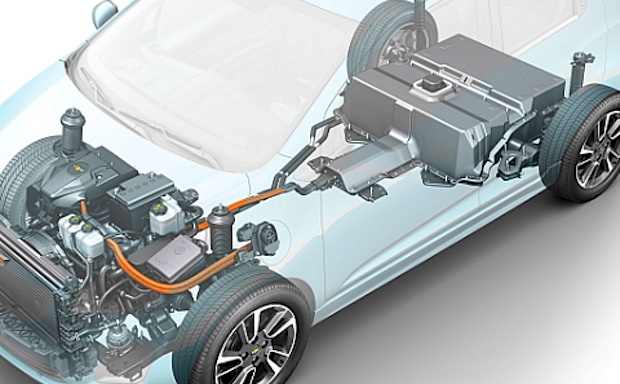
 ARPA–E announced RANGE program funding awards to accelerate electric vehicle adoption by improving battery technology to boost driving range, safety, and reliability. (Credit: ARPA–E.)
ARPA–E announced RANGE program funding awards to accelerate electric vehicle adoption by improving battery technology to boost driving range, safety, and reliability. (Credit: ARPA–E.)
The US Advanced Research Projects Agency–Energy has awarded $36 million to companies, universities, and national laboratories with an eye toward speeding development and commercialization of “transformational electric vehicle energy storage systems using innovative chemistries, architectures, and designs,” according to an agency news release (pdf). Dubbed Robust Affordable Next Generation Energy Storage Systems (RANGE), the program seeks to increase the range of electric vehicles and cut costs by “re-envisioning the total EV battery system, rather than working to increase the energy density of individual battery cells,” the release says.
The project involves funding for 22 companies and institutions to develop advanced battery technologies using four technical approaches—aqueous, robust non-aqueous, multifunctional, and solid state.
Awards in the aqueous technology category include funding for advanced aqueous lithium-ion batteries, as well as zinc-air, alkaline, acid, metal hydride-air, water-based flow, and rare-earth-free nickel metal hydride battery technologies. Robust non-aqueous technologies receiving funding include Li-ion, nanoelectrofuel flow, renewable organics, and impact-resistant electrolyte batteries. The multifunctional approach involves a variety of technologies, including formable batteries, improved joining and packaging to reduce costs, and cells that are better integrated into vehicle architecture, such as one project that aims to make battery packs part of the vehicle structure to reduce weight and cost.
Awards in the solid-state category focus on improved Li-ion and lithium-sulfur batteries. At least three of the solid-state projects funded are based on ceramic technology. These include:
- The University of Maryland, College Park, which will receive $574,275 to develop ceramic materials and processing methods for high-power, solid-state, lithium-ion batteries. Solid-state batteries have better damage tolerance than conventional liquid-based Li-ion batteries, reducing the need for protection and saving weight. The university will use multilayer ceramics processing methods to produce lighter solid-state battery packs with longer life, the award says.
- Solid Power LLC, Louisville, Colo., which will receive $3,459,250 for development of all-solid-state Li-ion batteries. According to its website, Solid Power is using low-cost ceramic–ceramic precursor materials to develop solid-state Li-ion batteries with specific energy nearly triple that of current cells.
- Ceramatec Inc., Salt Lake City, Utah, was awarded $2,966,691 to develop a nonporous, high-conductivity ceramic membrane for lithium-sulfur batteries. The company aims “to minimize self-discharge, provide mechanical integrity, and extend battery life,” according to the award. The company’s website says it is pursuing two technologies—sodium metal anodes with sodium conductive ceramic membranes, and lithium anodes with lithium conductive ceramic membranes.
More Information on all RANGE project awards is available here (pdf).
